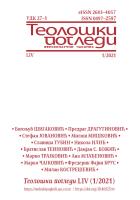Политичко-морална одговорност Цркве у савременом друштву: позив на преображај или херојски подухват?
Political and Moral Responsibility of the Church in Contemporary Society: A Call for Transf ormation, or A Call for Heroic Endeavor?
Author(s): Ana Mlađenović, Marko ČajkovićSubject(s): Christian Theology and Religion, Politics and religion, Eastern Orthodoxy, Sociology of Religion
Published by: Свети Архијерејски Синод
Keywords: Church; state; secularization; politics; contemporary society
Summary/Abstract: This paper will seek to apply its prism of intellectual optics to a comparative analysis of historical ambiences in which the Church has over time found itself stranded, with special emphasis on the means in which the Christian ethos manifests itself throughout sporadic key moments in history upon which the further course of Church history rests. Throughout the paper, the contemporary secular ambient in which the Church resides today, with special emphasis given to the social role and importance of the Church during crucial historical events. Manifestations of the deeds of the Church have echoed in the sphere of politics as well, and these deeds can be considered a form of political activism. We have wirtnessed some examples of intertwining of Church and government since the very dawn of Christianity, and it is a peculiar phenomenon which we believe has not been given sufficient academic scrutiny. Politics was present in Judea, in Rome, in Byzantium — everywhere, across space and time, politics has influenced the Church, and vice versa. This could lead to a sort of societal harmony and order rarely seen in the annals of world history, but it could also lead to sporadic conflicts between the two types of government: spiritual and temporal. Byzantium, for instance, is a prime example of this, as it is the archetypal Christian nation. Throughout other, more secular periods, we see the Church in former SFRY struggling to maintain itself against the tides of thenprevalent Marxist ideas. These historical dilemmas should provide us with an example of how the Orthodox Churches of today have the capacity within them to influence the course of history for the better. Hence, the key question which these examples and archetypes should provide an answer to is in which way the sociopolitical actions of the Church can be done in the spirit of the Gospels, especially in the era of liberal and secular society?
Journal: Теолошки погледи
- Issue Year: LIV/2021
- Issue No: 1
- Page Range: 179-210
- Page Count: 32
- Language: Serbian

